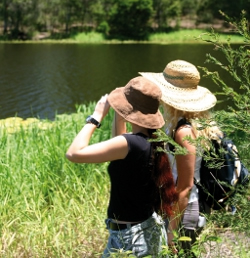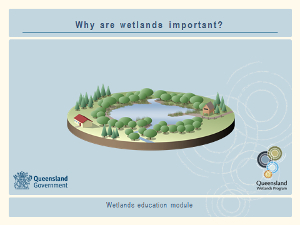Quick facts
- Trillions
- of US dollars' worth of ecosystem services (services) are provided by wetlands worldwide every year, making a vital contribution to human health and well-being. With the global population set to increase to nine billion by 2050, increasing pressure on water resources and the threats posed by climate change, the need to maximise these benefits has never been greater.[8]
Wetlands provide many services which are valued by humans but not all wetlands provide the same services, e.g. one wetland may be primarily valued for its natural features while other wetlands might be considered more important for their productivity or tourism values.
Values (ecosystem) represent the importance, worth, or significance that an ecosystem has for an individual, group or entity[5]. Values provide context to ecosystem services by linking them directly to the people or entities they benefit.
An ecosystem is said to have intrinsic value if it is valued by a non-human entity[2]. Intrinsic values recognise the Earth as a living being and a beneficiary and are often expressed through cultural and spiritual experiences, recognising the kinship ties that are linked to 'living as' the Earth[6][3][4]. Humans are not considered direct beneficiaries of intrinsic values.
Note that because intrinsic values are nature-centric and not directly valued by humans, intrinsic values are not based on ecosystem services (which are anthropocentric)[2][7][1]. Attempts to capture intrinsic values in ecosystem service frameworks are generally through the form of existence and bequest values[2][7].
Existence values are those values that people place on something because that entity exists. Existence values are human-oriented[2].
There are a range of factors that influence what services a wetland provides and how people value them, including its location, size, type, and condition. Most wetlands have multiple values for a range of beneficiaries and managing wetlands effectively involves balancing these values to achieve the best outcomes economically, socially, culturally, and environmentally.

In general, wetlands are highly productive and valuable aquatic ecosystems because they:
- provide a buffer against coastal erosion, storm surges and flooding which helps build resilience to flood and cyclone events
- help maintain or improve water quality by transforming and retaining nutrients and sediment from run-off which would otherwise go into creeks and rivers that flow to the ocean. This in turn benefits humans by providing clean water.
- are a source of blue carbon*, playing a vital role in the carbon cycle by sequestering and storing carbon dioxide thereby reducing climate variability
- provide an important nursery for varieties of fish and crustaceans, including many that form the basis of economically important fisheries
- provide habitat vital for the survival of a range of plants and animals
- are hotspots of productivity and biodiversity
- provide many opportunities for recreation and tourism and support research and educational activities
- deliver a range of products such as medicine, food, and water vital for people, livestock, agriculture, and industry
- provide important cultural, spiritual, or aesthetic services and improve human well-being.
Central to maintaining and protecting the values of internationally and nationally important wetlands is understanding and documenting their ecological character. Ecological character is the combination of the ecosystem components, processes and benefits/services that characterise the wetland at a given point in time[2].
The National framework for describing the ecological character of Australian Ramsar Wetlands provides an example of how an understanding of the components, processes and services of wetlands is being used to inform management and research initiatives and identify pressures on wetlands.
More information on ecosystem services, how they are classified, and full list of services based on CICES is available.
More information on beneficiaries and stakeholders, how they are classified, and a full list of beneficiaries is available.
Wetland on-line education modules
A series of on-line education modules, including Why are wetlands important? and Deriving benefits and services from wetlands, have been prepared as a resource for people who want to learn more about wetlands.
Users can download and use the contents of this education module to meet their learning and training needs. This information should be used in conjunction with information found on this website.
- Measuring and accounting for the benefits of restoring coastal blue carbon ecosystems
- Atlas of Ocean Wealth
- Natural Capital Roadmap - Climate Works Australia:
- Towards an Emissions Reduction Fund Method for Blue Carbon
- Technical review of opportunities for including blue carbon in the Australian Government’s Emissions Reduction Fund
- Blue Carbon in the Great Barrier Reef Catchments
- CICES Towards a common classification of ecosystem services
- System of Environmental-Economic Accounting (SEEA)
- Tools for measuring, modelling, and valuing ecosystem services: Guidance for Key Biodiversity Areas, natural World Heritage sites, and protected areas
- Natural assets for flood and cyclone resilience (PDF, 0.4 MB)
- Literature review of the economic value of ecosystem services that wetlands provide
- InVEST: Integrated Valuation of Environmental Services and Trade-offs (Natural capital project)
- Ecosystems and Human Well-being: Wetlands and Water – Millennium Ecosystem Assessment (PDF)
- The Economics of Ecosystems and Biodiversity for Water and Wetlands
- Waterlines 87: Recognising the broader benefits of aquatic systems in water planning: an ecosystem services approach
- Assessing ecosystem services - TESSA
- Queensland’s saltmarsh habitats: values, threats and opportunities to restore ecosystem services (PDF)
*Blue carbon is the term used to describe the carbon stored in coastal ecosystems: mangroves, tidal marshes, and seagrasses. Protecting and restoring blue carbon ecosystems offers opportunities for carbon sequestration and avoidance of greenhouse gas emissions. If these ecosystems are degraded or damaged, their carbon sequestration capacity may be lost or adversely affected, resulting in the release of carbon dioxide into the atmosphere contributing to greenhouse emissions.
Pages under this section
References
- ^ Batavia, C & Nelson, MP (May 2017), 'For goodness sake! What is intrinsic value and why should we care?', Biological Conservation. [online], vol. 209, pp. 366-376. Available at: https://linkinghub.elsevier.com/retrieve/pii/S0006320716307522 [Accessed 5 April 2022].
- ^ a b c d e Chan, KMA, Satterfield, T & Goldstein, J (February 2012), 'Rethinking ecosystem services to better address and navigate cultural values', Ecological Economics. [online], vol. 74, pp. 8-18. Available at: https://linkinghub.elsevier.com/retrieve/pii/S0921800911004927 [Accessed 23 June 2021].
- ^ Gould, RK, Pai, M, Muraca, B & Chan, KMA (2 September 2019), 'He ʻike ʻana ia i ka pono (it is a recognizing of the right thing): how one indigenous worldview informs relational values and social values', Sustainability Science. [online], vol. 14, no. 5, pp. 1213-1232. Available at: http://link.springer.com/10.1007/s11625-019-00721-9 [Accessed 5 April 2022].
- ^ Intergovernmental Science-Policy Platform On Biodiversity And Ecosystem Services (9 July 2022), Summary for policymakers of the methodological assessment of the diverse values and valuation of nature of the Intergovernmental Science-Policy Platform on Biodiversity and Ecosystem Services (IPBES). [online], Zenodo. Available at: https://zenodo.org/record/6522392 [Accessed 12 July 2022].
- ^ Jones, NA, Shaw, S, Ross, H, Witt, K & Pinner, B (2016), 'The study of human values in understanding and managing social-ecological systems', Ecology and Society. [online], vol. 21, no. 1, p. art15. Available at: http://www.ecologyandsociety.org/vol21/iss1/art15/ [Accessed 25 October 2021].
- ^ O’Connor, S & Kenter, JO (September 2019), 'Making intrinsic values work; integrating intrinsic values of the more-than-human world through the Life Framework of Values', Sustainability Science. [online], vol. 14, no. 5, pp. 1247-1265. Available at: http://link.springer.com/10.1007/s11625-019-00715-7 [Accessed 24 March 2021].
- ^ a b Sheng, HX, Xu, H, Zhang, L & Chen, W (June 2019), 'Ecosystem intrinsic value and its application in decision-making for sustainable development', Journal for Nature Conservation. [online], vol. 49, pp. 27-36. Available at: https://www.researchgate.net/publication/330843243_Ecosystem_intrinsic_value_and_its_application_in_decision-making_for_sustainable_development [Accessed 22 September 2022].
- ^ Ramsar. Wetland Ecosystem Services – an introduction. [online] Available at: https://www.ramsar.org/sites/default/files/documents/library/services_00_e.pdf [Accessed 19 November 2012].
Last updated: 24 April 2025
This page should be cited as:
Department of Environment, Science and Innovation, Queensland (2025) Wetland services and values, WetlandInfo website, accessed 8 May 2025. Available at: https://wetlandinfo.des.qld.gov.au/wetlands/management/wetland-values/


 — Department of the Environment, Tourism, Science and Innovation
— Department of the Environment, Tourism, Science and Innovation




